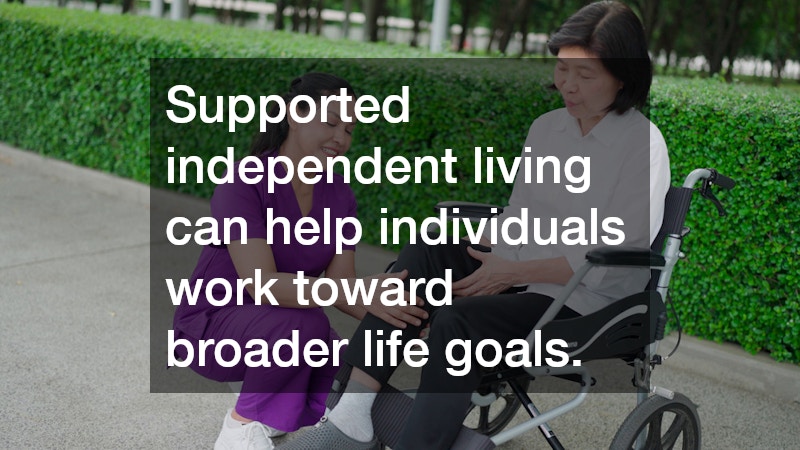Supported independent living offers a structured pathway to achieve that independence by providing the assistance individuals need while encouraging personal growth and self-sufficiency. This model of care is designed to build confidence, develop daily living skills and offer greater control over personal choices.
While everyone’s journey is different, supported independent living provides the tools and environment that empower individuals to live more freely, make decisions and participate more fully in their communities. It is not just about housing, but about fostering ability, purpose and dignity.
Encouraging Personal Responsibility
One of the key features of supported independent living is its focus on helping individuals take ownership of their daily lives. Rather than doing everything for a person, support workers guide and assist them to carry out tasks for themselves. This includes cooking meals, managing money, cleaning, taking public transport and attending appointments.
By encouraging responsibility, supporting independent living helps individuals build habits that support long-term independence. These tasks might seem small, but each success boosts self-esteem and shows what is possible with the right guidance and encouragement.
As confidence grows, individuals are more likely to set new goals, try new activities and take pride in their abilities. They become active participants in their care and their future, rather than feeling dependent on others.
Developing Essential Life Skills
Daily living skills are essential for managing life as independently as possible. In supported independent living, individuals receive tailored assistance that targets their unique needs and goals. This might involve help with meal planning, learning how to do laundry or understanding how to budget for weekly expenses.
Skill development is typically built into everyday routines, making it practical and relevant. This real-world learning helps individuals apply what they learn immediately and adapt to challenges as they arise. The support team works alongside the individual, offering guidance but allowing space to practise and learn at their own pace.
These skills form the foundation of independent living, enabling people to make choices about how they live, what they eat, when they go out and how they manage their own space. Over time, these achievements become stepping stones toward greater independence and self-reliance.
Building Confidence Through Social Interaction
Living more independently does not mean being isolated. Supported independent living encourages positive social interaction and community participation. Many supported living arrangements involve shared homes with other residents, offering opportunities to build friendships and social skills in a safe and respectful environment.
Support workers help residents engage with their local community by attending events, joining clubs or simply going out for a coffee or walk. These experiences help individuals feel more connected and confident in navigating public spaces and interacting with others.
Social confidence plays a big role in overall well-being. Feeling accepted and included improves mental health, reduces loneliness and encourages ongoing personal development. With support in place, individuals are free to explore new interests and strengthen their sense of belonging.
Encouraging Choice and Control
Choice is a central part of supported independent living. People are encouraged to make decisions about their routines, their home environment and how they spend their time. This control promotes a sense of independence and autonomy that many people living with disability may not have experienced before.
Whether choosing what to cook for dinner, how to decorate a room or deciding on a daily schedule, these choices allow individuals to express themselves and take ownership of their lives. Support workers help facilitate these decisions, offering advice when needed but always respecting the individual’s preferences.
Being able to make decisions builds problem-solving skills and confidence. It also teaches individuals how to advocate for themselves and communicate their needs clearly, both at home and in the community.
Supporting Long-Term Goals
Beyond daily living, supported independent living can help individuals work toward broader life goals. This might include preparing for employment, studying a new skill or transitioning to a more independent housing option in the future.
Support plans are developed in collaboration with the individual, focusing on what matters most to them. These plans are reviewed regularly to track progress, celebrate achievements and adjust strategies as needed.
Having goal-focused support ensures that individuals continue to grow and build skills over time, rather than remaining stuck in a fixed routine. With encouragement and structure, many people can reach milestones they once thought were out of reach.
Supported independent living plays a powerful role in helping people with disability live fuller, more independent lives. By focusing on skill-building, personal responsibility and meaningful choice, this model of care helps individuals grow in confidence and ability.
It is not just about living in a supported home, but about being supported to thrive. Through guidance, patience and positive encouragement, individuals can take control of their daily lives, build lasting social connections and work toward the future they choose for themselves.

